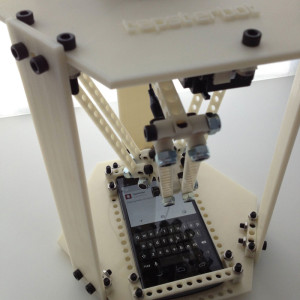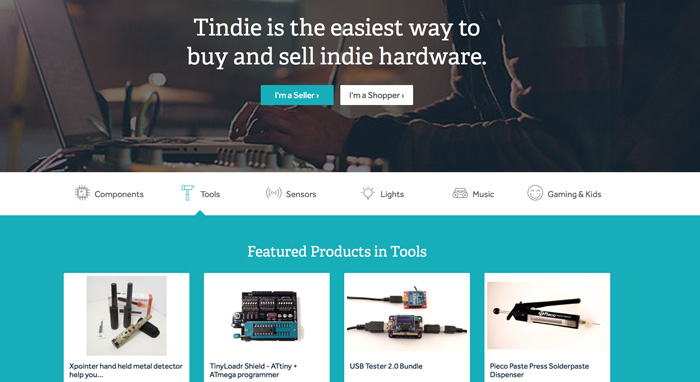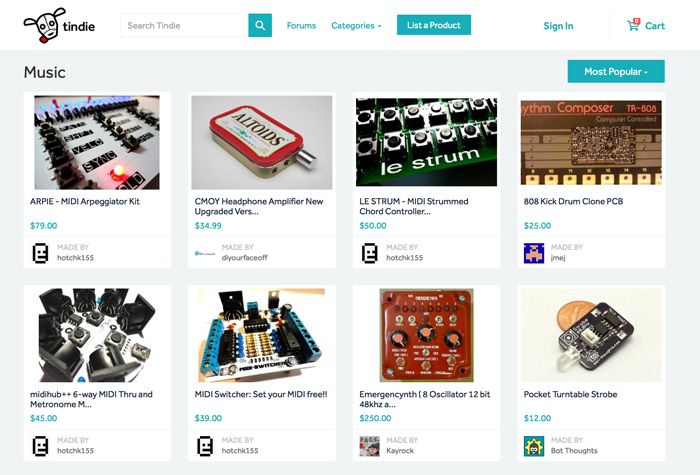As the Maker revolution continues, with the potential to permeate mainstream culture (my bet is that it will!), there are new opportunities for businesses to ride the wave. It didn’t start out with the Maker movement in mind, but Tindie is one startup that will benefit from the explosion of ‘prosumerism.’
In some ways, Tindie is a bit like Etsy for gadgets, an online marketplace for DIYers to sell their hardware. It began in 2012 as a place for doing away with left over bits from projects, but, as orders reached 1,000 in its first seven months and 10,000 after seven months more, the site started to grow into an all around Maker mall. The company’s CEO, Emile Petrone, tells Pando Daily, “As word got out it has really broadened.” Tindie is now filled with anything you’d need to strap together a RepRap or experiment with your own Arduino-based apparatus: GPS boards, Bluetooth modules, even this moisture sensor!
As a place for prosumers to sell their various electronics, Petrone believes that it can act as an incubator for entrepreneurs that allows them to avoid the sometimes difficult world of crowd funding. He says, “You launch on Kickstarter and you’re saddled with the curse of success, producing a product just as it was in the video, stuck in this one thing for over a year. Your price points are inevitably wrong, your sales projections are inevitably wrong, you realize the amount of money you raised doesn’t cover the costs.” And, if a Kickstarter campaign can’t fulfill its orders, a creator can potentially feel defeated.
Tindie, then, can be a testing space for the hardware that Makers are working on. The CEO says that most Tindie shop owners only sell less than 100 units, giving them the chance to prototype their designs over the course of multiple iterations, with Petrone explaining, “It’s growing your business the old fashioned way.” Tindie’s model may actually be a welcome relief for would-be inventors whose products may only appeal to a limited number of people.
This is especially true when it comes to something like Tapster, a 3D-printable mobile phone using robot developed by a user calling himself “hugs”. The delta bot is outfitted with a pointer that “simulates a human finger on a capacitive touchscreen device” to tap out operations on your smartphone. hugs appeals to app developers saying, “[A]ny time you change a line of code, you need to check that every important interaction still works in the app on a real device. Sure, you can manually check things yourself, or have you
At the moment, Petrone isn’t exactly sure what the future growth of his company will look like. He can see that there is a demand for such a site, particularly as the Maker movement continues to grow. Still, he’s warned investors, including Andreessen Horowitz – who gave the company $1.2 million in a seed funding – that it’s difficult to determine how big Tindie will actually get. Despite the fact that Etsy is inching towards the sale of electronics, after purchasing an independent hardware company, Petrone tells Pando that Tindie is more directed at Makers and small businesses, rather than consumers. And the CEO believes, “Tindie has the most momentum in the space. We’ve basically got the lead. The opportunity is clear. But the timing is not.”
Whether or not Tindie maintains its lead, the site’s model is an interesting one and is evidence that entrepreneurs and small business people need alternatives for launching their products. As the Maker movement grows, this will become increasingly true for those developing their own electronics. Tindie seems to be one great route for speciality manufacturers that would face inevitable failure on a crowdfunding site, but might appeal to a niche group of customers. Now, I just wish that Kickstarter artists would get the picture and head back to Etsy.
Source: Pando Daily




